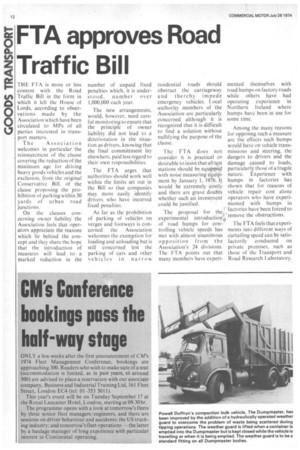FTA approves Road Traffic Bill
Page 14

If you've noticed an error in this article please click here to report it so we can fix it.
THE FTA is more or less content with the Road Traffic Bill in the form in which it left the House of Lords, according to observations made by the Association which have been circulated to M Ps of all parties interested in transport matters.
The Association welcomes in particular the reinstatement of the clause covering the reduction of the minimum age for driving heavy goods vehicles and the exclusion, from the original Conservative Bill, of the clause proposing the prohibition of parking within 30 yards of urban road junctions.
On the clauses concerning Owner liability the Association feels that operators appreciate the reasons which lie behind the concept and they share the hope that the introduction of measures will lead to a marked reduction in the number of unpaid fixed penalties which, it is understood, number over 1,000,000 each year.
The new arrangements, would, however, need careful monitoring to ensure that the principle of owner liability did not lead to a deterioration in the situation as drivers, knowing that the final committment lay elsewhere, paid less regard to their own responsibilities.
The FTA urges that authorities should work well within the limits set out in the Bill so that companies may more easily identify drivers who have incurred fixed penalties.
As far as the prohibition of parking of vehicles on verges and footways is concerned the Association welcomes the exemption for loading and unloading but is still concerned lest the parking of cars and other vehicles in narrow residential roads should obstruct the carriageway and thereby impede emergency vehicles. Local authority members of the Association are particularly concerned although it is recognized that it is difficult to find a solution without nullifying the purpose of the clause.
The FTA does not consider it is practical or desirable to insist that alitest stations should be equipped with noise measuring equipment by January 1, 1976. It would be extremely costly and there are grave doubts whether such an investment could be justified.
The proposal for the... experimental introductionl,' of road humps for con-" trolling vehicle speeds has met with almost unanimous Opposition from the Association's 24 divisions. The FTA points out that many members have experi mented themselves with road humps on factory roads while others have had operating experience in Northern Ireland where humps have been in use for some time.
Among the many reasons for opposing such a measure are the effects such humps would have on vehicle transmissions and steering, the dangers to drivers and the damage caused to loads, particularly those of a fragile nature. Experience with humps in factories has shown that for reasons of vehicle repair cost alone operators who have experimented with humps in factories have been forced to remove the obstructions.
The FTA feels that experiments into different ways of curtailing speed can be satisfactorily conducted on private premises, such as those of the Transport and Road Research Laboratory.
































































































